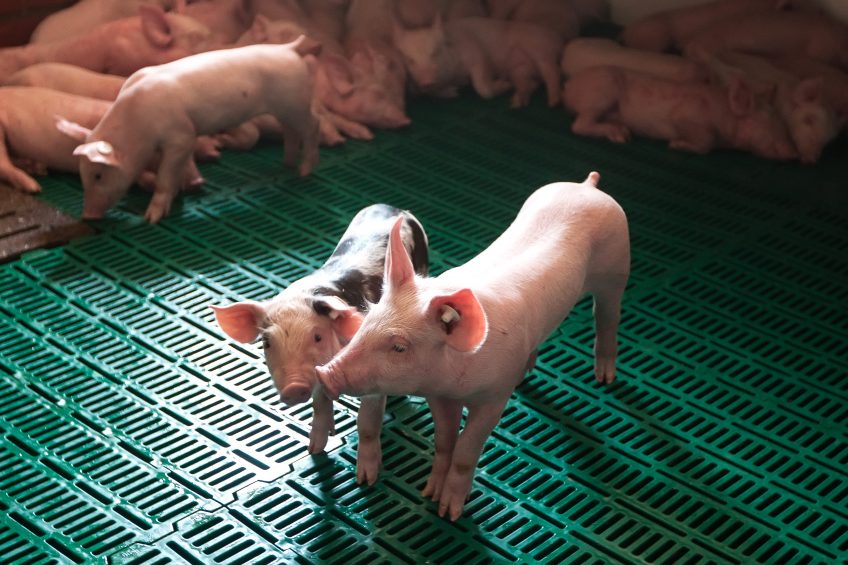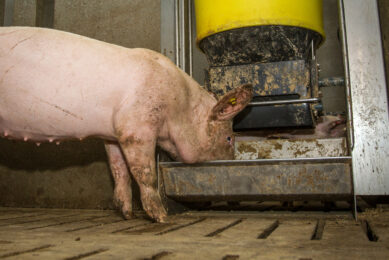The role of alpha-monoglycerides in eubiotic nutrition

Eubiotic nutrition combines modern technology with the use of non-antibiotic feed additives. The strategy is a way to overcome dysbiosis – an imbalance in the microflora of the pig’s gastro-intestinal tract.
The ban on animal protein sources and consequently the sole use of vegetable proteins since the year 2000 and the ban on antibiotic growth promoters (AGP’s) since the year 2006, makes it a real challenge for nutritionists to formulate high quality diets for high performing production animals.
Non-digested nutrients in the pig’s gut
Any non-digested nutrient, especially protein, is a potential source for pathogenic bacteria to develop and to colonise the small intestines of the host animal. Furthermore, managing an optimal balance of the microflora in the gastrointestinal tract (GIT), also termed as eubiosis, became more difficult due to the change in available feed components.
Feed additives can be a very helpful tool to promote eubiosis and overcome dysbiosis, which is an imbalance in the microflora of the GIT. This brings us to the concept of ‘eubiotic nutrition’. Eubiotic nutrition is another approach for today’s modern animal production and combines modern nutritional technology with the use of non-antibiotic feed additives.
Eubiotic nutrition is a three step strategy. The first step is to liberate energy and proteins from the feed with the help of multi-enzyme systems. The second step is to maximise nutrient absorption by lysolecithins. And the third step is to manage an optimal GI-microflora to stimulate gut health.
Managing the gastro-intestinal microflora
There are several ways to stimulate (gut) health. Short- and medium chain fatty acids have been widely implemented for decades. However, they have a potential antimicrobial effect in their undissociated form and due to their relatively low pKa (dissociation constant) they act mainly in the acidic gastric environment of the animal and mainly against gram-negative bacteria. On the contrary, alpha-monoglycerides of these fatty acids are much more powerful in their antibacterial effect according to scientific research.
Alpha-monoglycerides are a class of glycerides that are composed of a fatty acid linked to the sn1-position of a glycerol molecule via an ester bond. This bond makes alpha-monoglycerides remain undissociated independently from the pH.
Dissociating in the intestines
Whereas organic acids will dissociate in the neutral environment of the intestines, alpha-monoglycerides will not dissociate and will be able to perform their antibacterial properties throughout the whole gastro-intestinal tract, which is important for optimal gut health.
Alpha-monoglycerides of short chain fatty acids are known to be more active against gram-negative bacteria, whereas the alpha-monoglycerides of medium chain fatty acids are more active against gram-positive bacteria. Depending on the bacterial challenge on the farm, FRAmelco has several solutions targeting specific pathogens. When a broad spectrum antibacterial effect is required, FRA Gut Balance is the key to overcome bacterial challenges from both gram-negative and gram-positive bacteria, as this product contains alpha-monoglycerides of short- and medium chain fatty acids. Furthermore, the product supplies butyric acid glycerides, promoting gut health and thus general nutrient absorption and animal performance.
Piglet performance
The beneficial effect of combining alpha-monoglycerides of short- and medium chain fatty acids have been confirmed in piglets. Piglets at a commercial fattening pig farm received 2 kg FRA Gut Balance Liquid per ton feed and were compared with a control group in which the piglets did not receive the additive.
Due to the farm management, the trial period of the control group was 5 days longer than the treatment group. Nevertheless, the results are promising, as the average daily growth was increased with 41 g and FCR was improved from 2.54 to 2.37 when using the additive (see Table 1), despite the fact that the starting weight of the piglets in the treatment group was a bit lower.
Valid non-antibiotic feed additive
Alpha-monoglycerides have proven to be valid non-antibiotic feed additives within the concept of ‘eubiotic nutrition’, managing the intestinal microflora, stimulating optimal gut health, consequently improving nutrient absorption and finally resulting in better zootechnical performances.
However, in order to maximise animal performances, liberation and absorption of feed nutrients should be further taken into consideration as well with the judicious use of multi-enzyme systems and lysolecithins.











